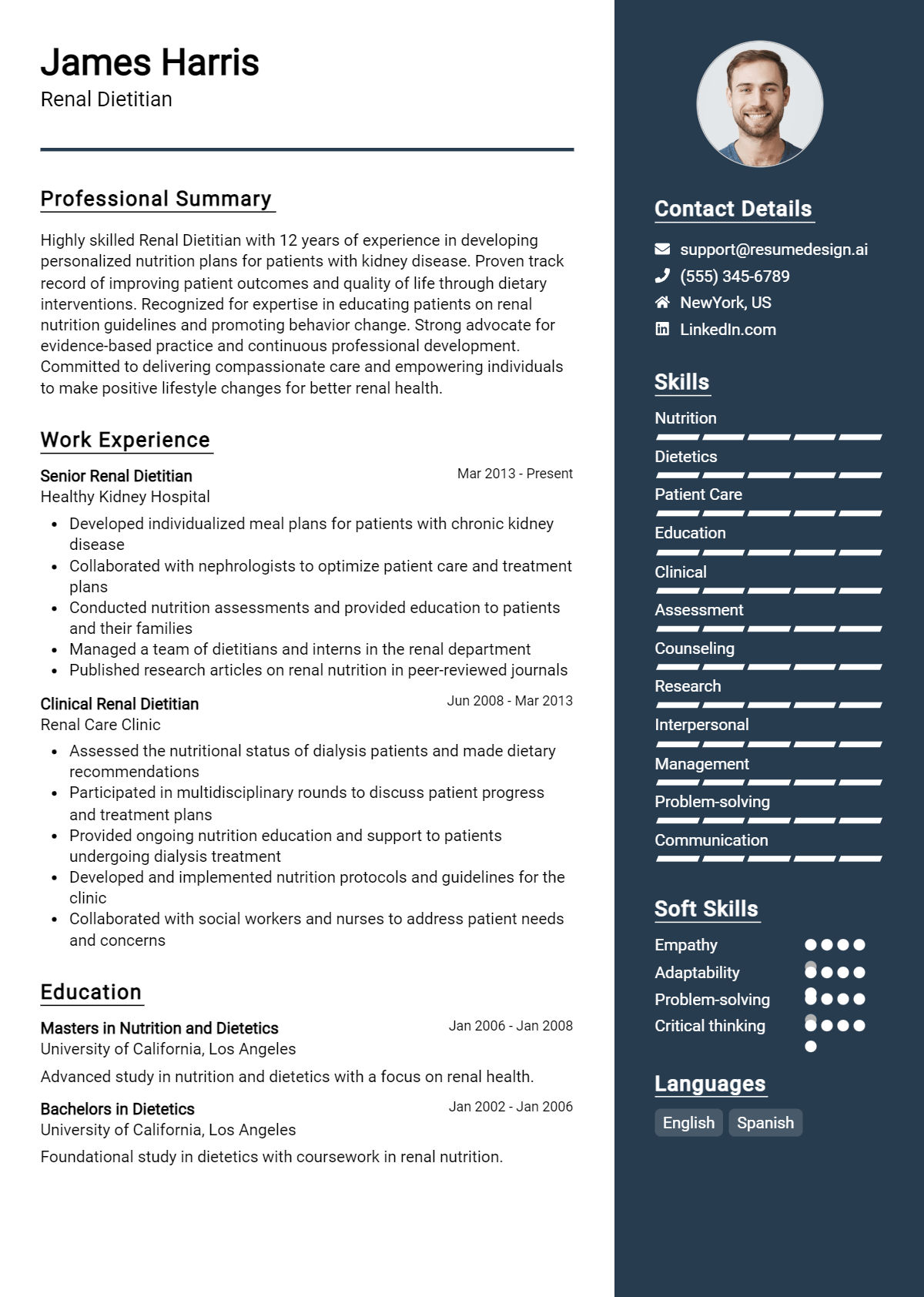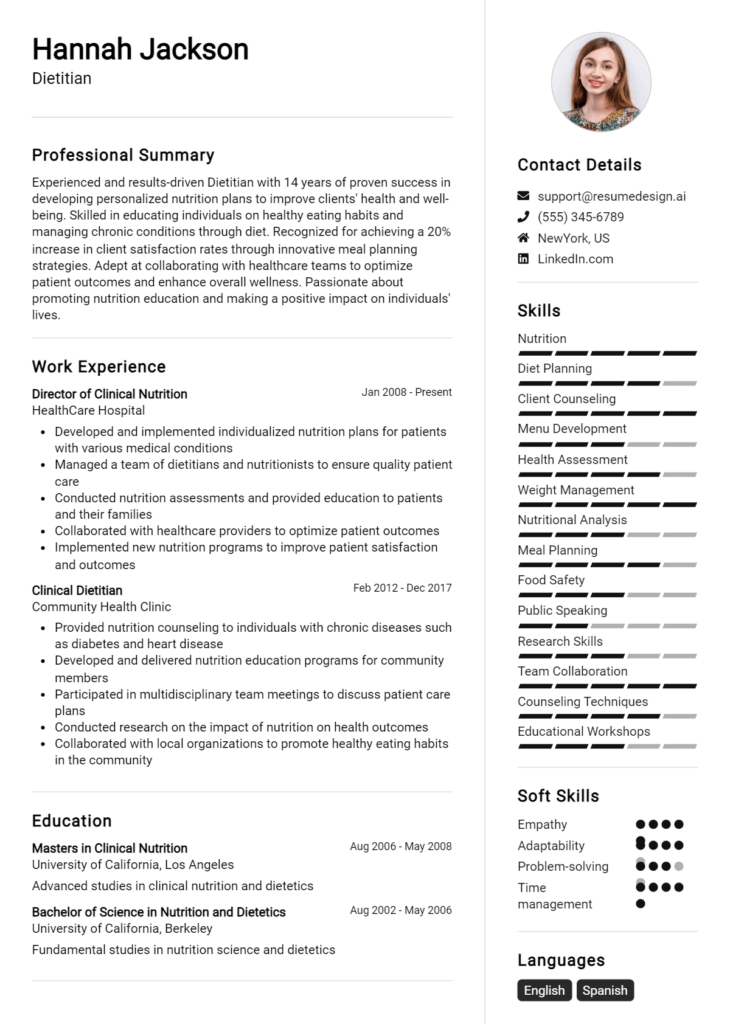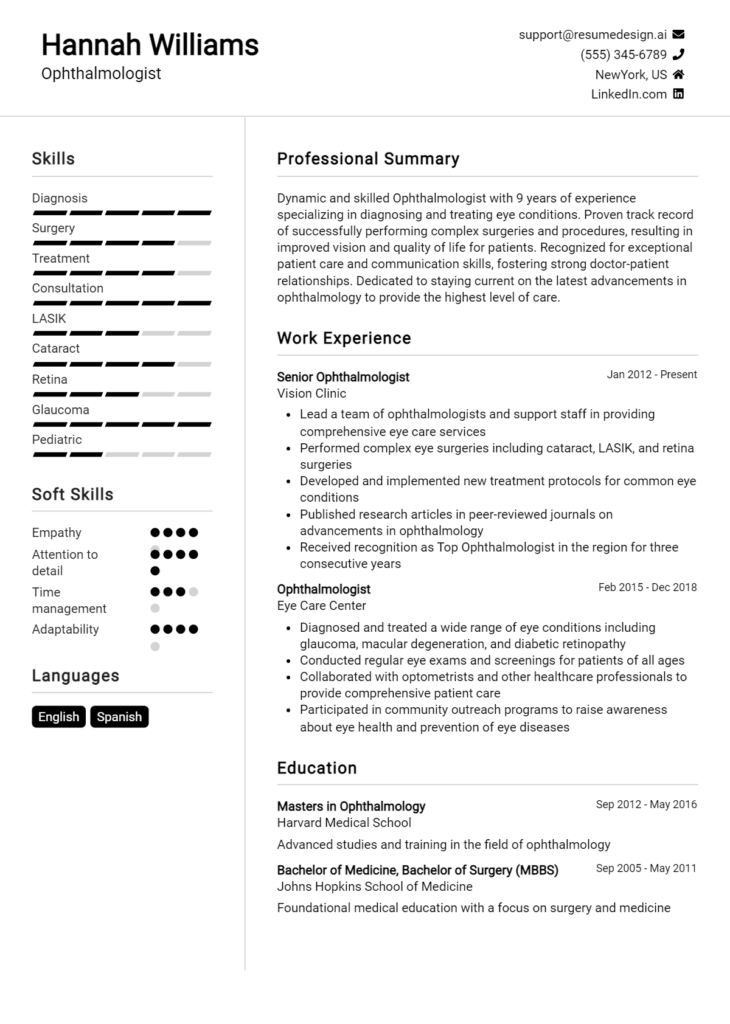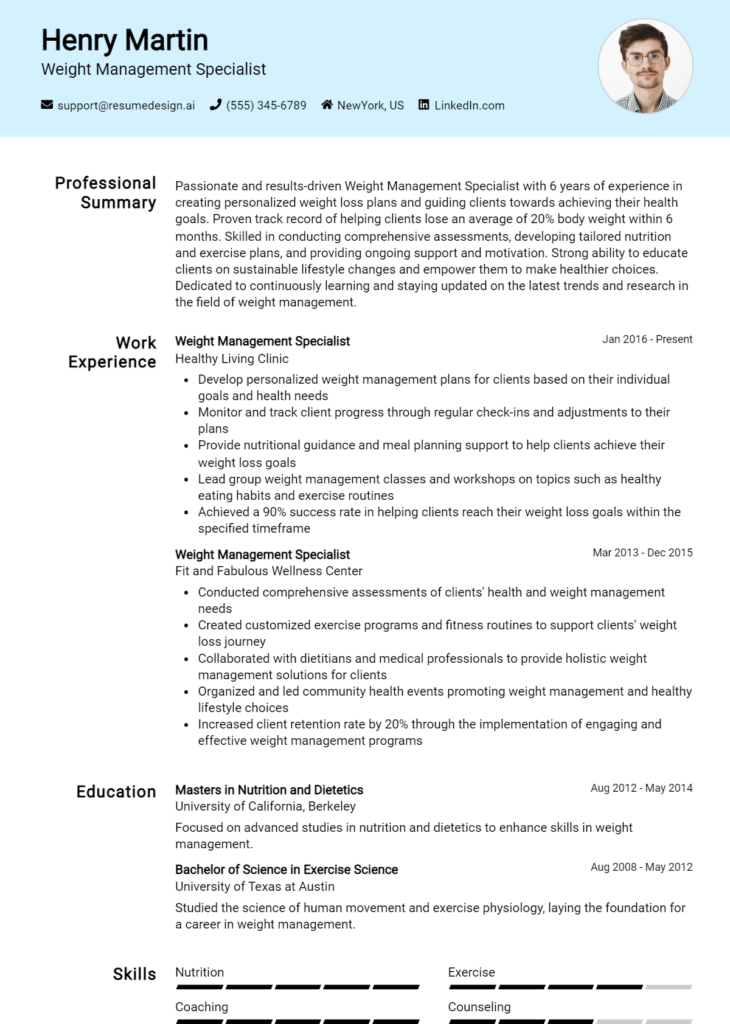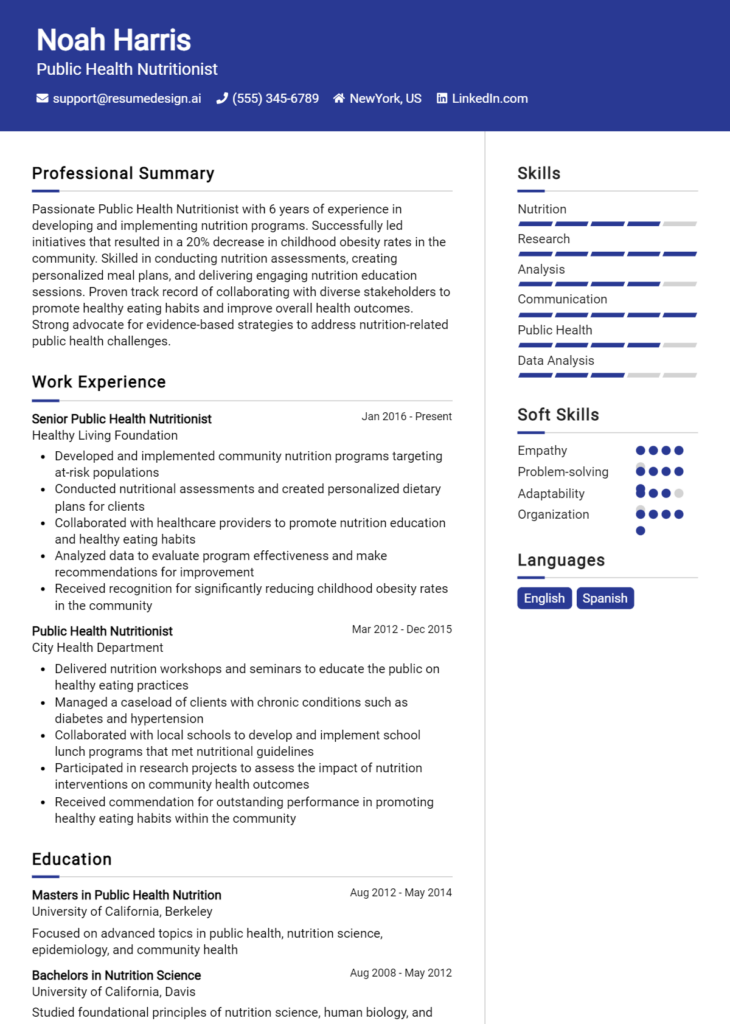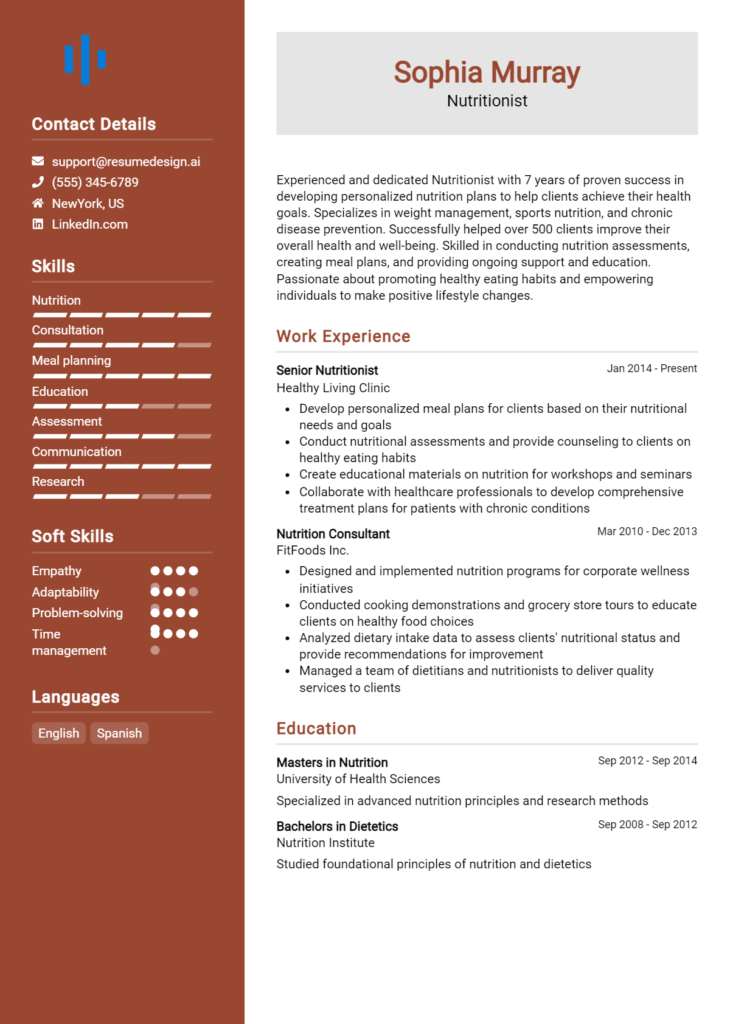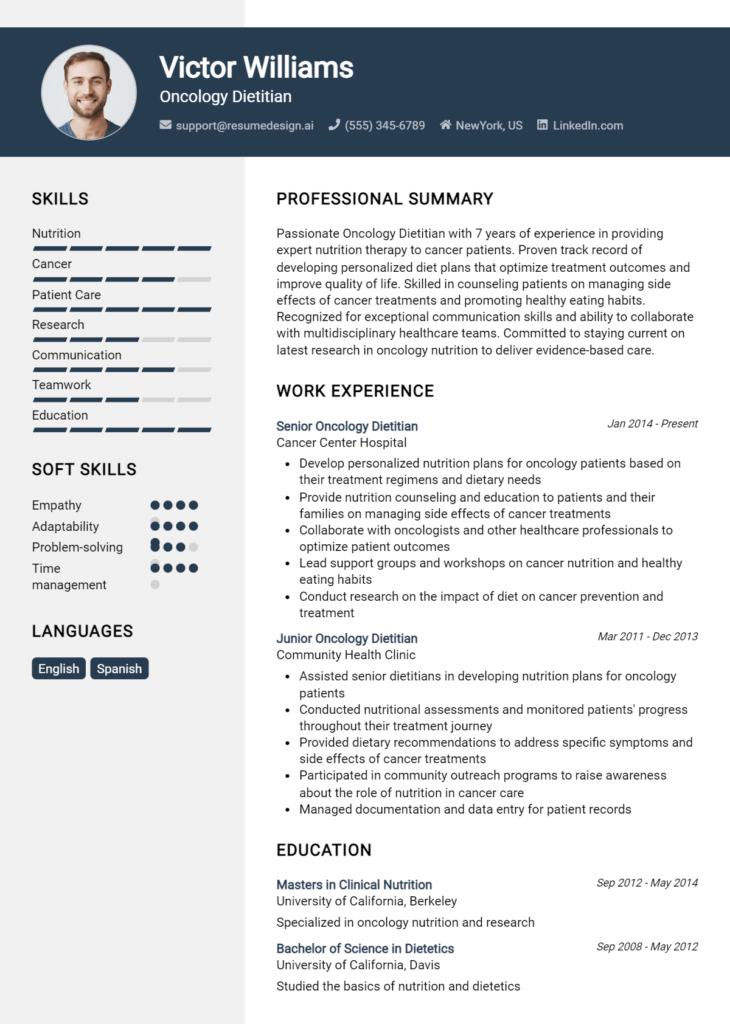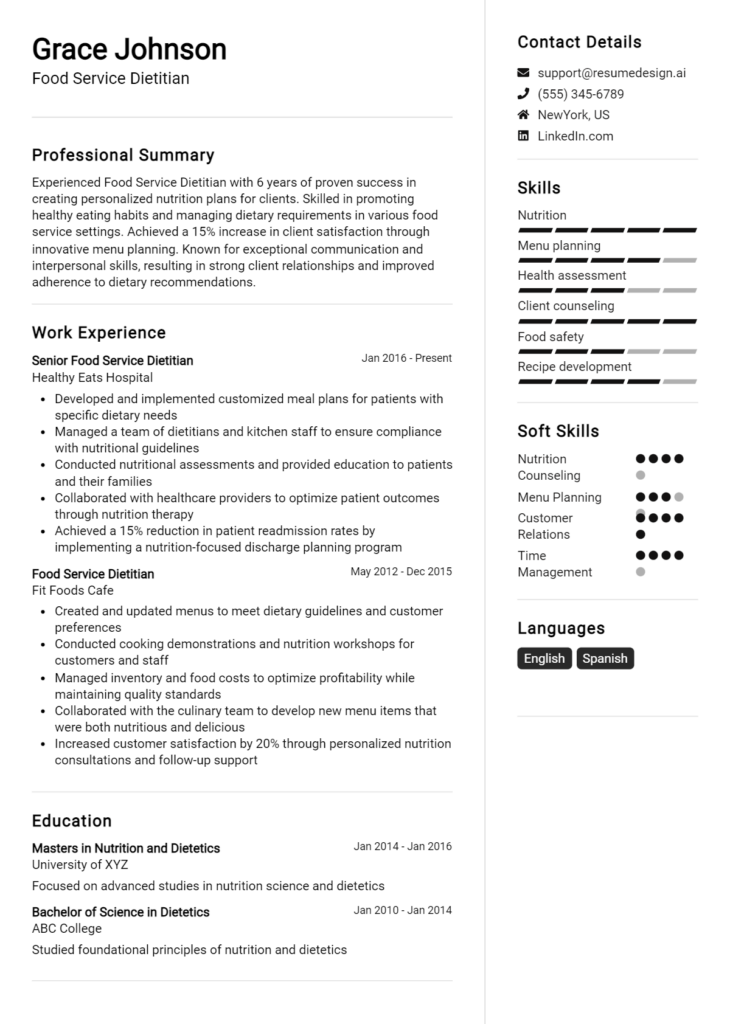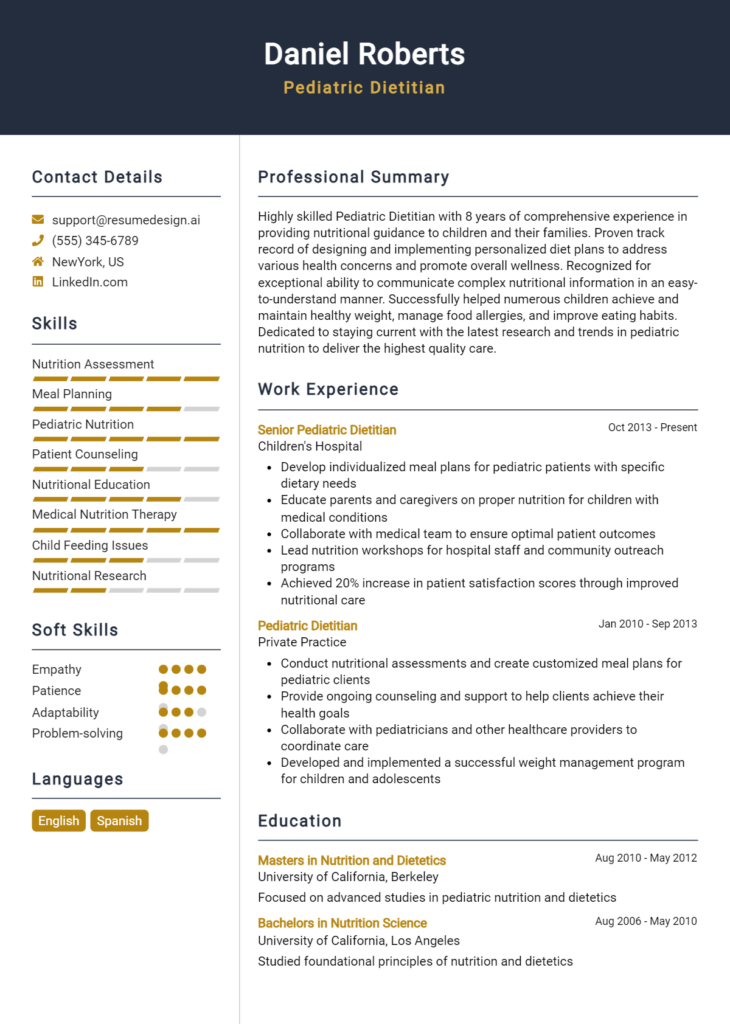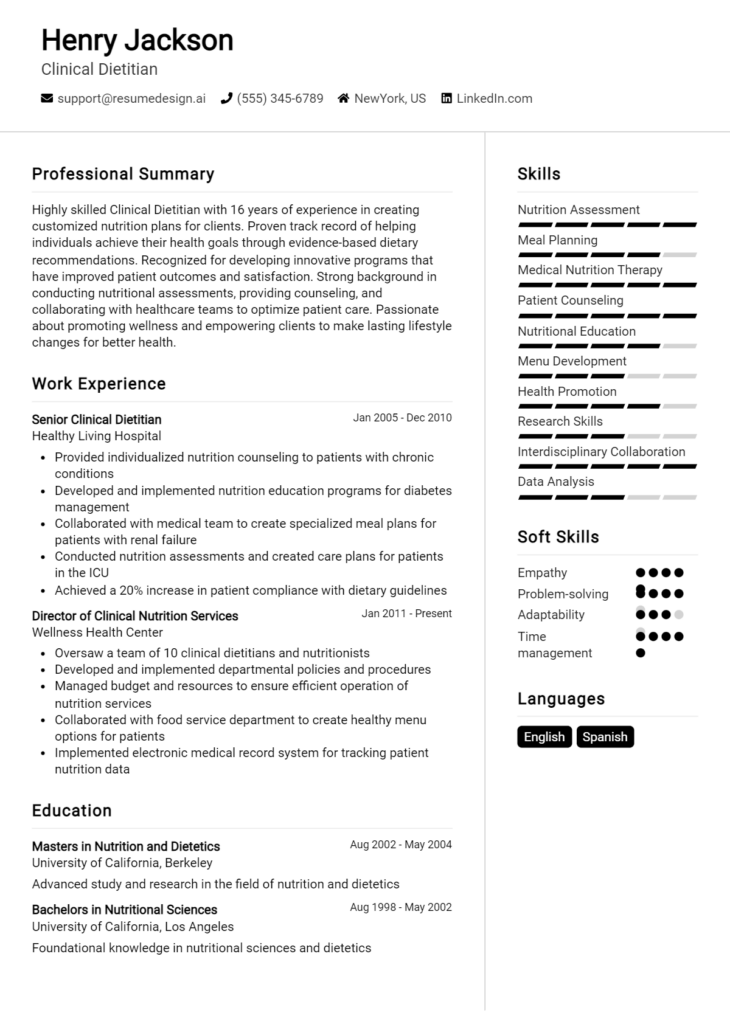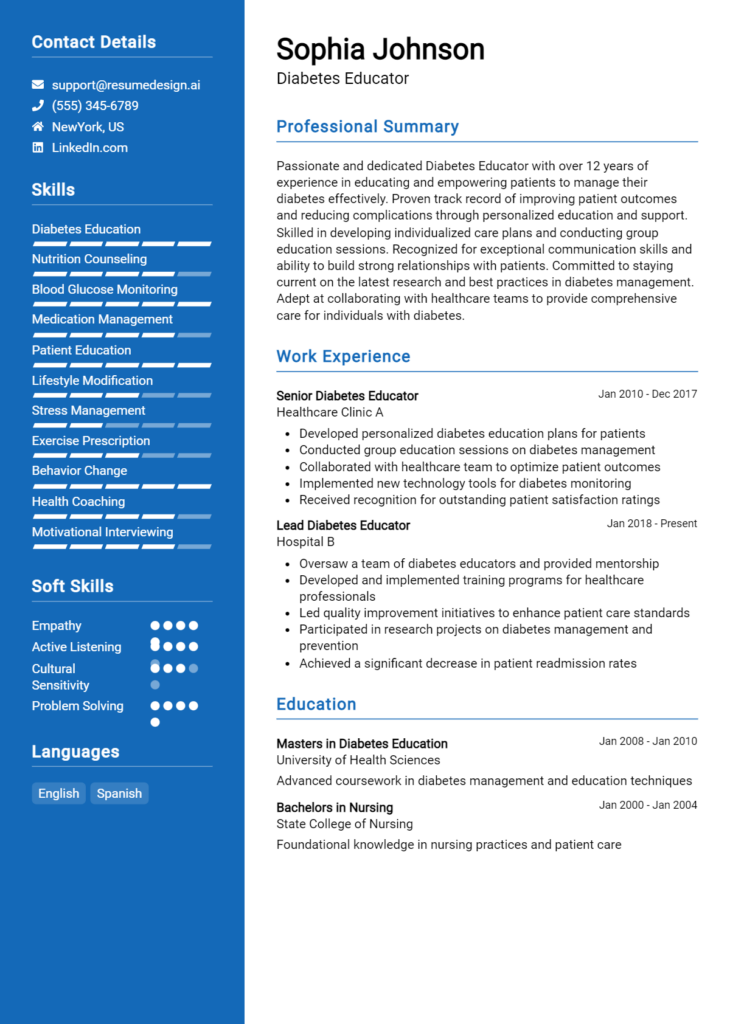Renal Dietitian Core Responsibilities
A Renal Dietitian plays a crucial role in managing patients with kidney-related issues by developing tailored dietary plans that promote health and wellness. Key responsibilities include assessing nutritional needs, collaborating with nephrologists and healthcare teams, and educating patients on dietary modifications. Essential skills encompass technical knowledge of renal nutrition, operational efficiency in patient management, and strong problem-solving abilities to address diverse dietary challenges. A well-structured resume highlighting these qualifications is vital to showcase the impact of the Renal Dietitian on the organization's overall health objectives.
Common Responsibilities Listed on Renal Dietitian Resume
- Conduct comprehensive nutritional assessments for renal patients.
- Develop and implement individualized meal plans based on patient needs.
- Monitor and evaluate patient progress and dietary adherence.
- Provide education and counseling on renal nutrition to patients and families.
- Collaborate with multidisciplinary teams to optimize patient care.
- Stay updated on research and advancements in renal nutrition.
- Assist in developing educational materials and workshops.
- Document patient care and dietary recommendations accurately.
- Advocate for patient access to necessary nutritional resources.
- Participate in quality improvement initiatives within the department.
High-Level Resume Tips for Renal Dietitian Professionals
In the competitive field of renal nutrition, having a well-crafted resume is essential for Renal Dietitian professionals. Your resume is often the first impression you make on potential employers, and it serves as a powerful tool to showcase your skills, experiences, and achievements. A strong resume not only outlines your qualifications but also highlights your understanding of renal dietary needs and your ability to provide exceptional patient care. This guide will provide practical and actionable resume tips specifically tailored for Renal Dietitian professionals, empowering you to present your best self to prospective employers.
Top Resume Tips for Renal Dietitian Professionals
- Tailor your resume to each job description by incorporating relevant keywords and phrases from the posting.
- Highlight your clinical experience in renal nutrition, including any hospital or outpatient settings where you've worked.
- Quantify your achievements where possible, such as the number of patients you've successfully managed or improved outcomes through dietary interventions.
- Include certifications related to renal nutrition, such as Board Certification in Nutrition Support (BCNS) or Certified Specialist in Renal Nutrition (CSRN).
- Showcase skills specific to renal dietetics, such as proficiency in dietary assessment, patient education, and interdisciplinary team collaboration.
- Utilize a clean and professional format that enhances readability and draws attention to your most important qualifications.
- Incorporate examples of how you’ve developed or implemented nutrition care plans tailored to individual patient needs.
- Demonstrate your commitment to continuing education and staying current with the latest research and guidelines in renal nutrition.
- Include any relevant volunteer work or extracurricular activities that demonstrate your passion for renal health and nutrition.
By implementing these tips, you can significantly increase your chances of landing a job in the Renal Dietitian field. A well-structured and targeted resume will not only catch the attention of hiring managers but will also effectively communicate your qualifications and dedication to improving patient care through nutrition.
Why Resume Headlines & Titles are Important for Renal Dietitian
In the competitive field of renal nutrition, a well-crafted resume headline or title plays a pivotal role in capturing the attention of hiring managers. This brief yet powerful phrase serves as the first impression, summarizing a candidate's key qualifications and expertise in renal dietetics. A strong headline can effectively highlight essential skills, certifications, or achievements relevant to the position, making it easier for employers to see the potential fit for their team. It should be concise, relevant, and directly aligned with the job being applied for, ensuring that the candidate stands out amidst a sea of applicants.
Best Practices for Crafting Resume Headlines for Renal Dietitian
- Keep it concise: Aim for a headline that is brief yet impactful, ideally no more than 10-12 words.
- Be role-specific: Tailor the headline to reflect the specific position of a renal dietitian.
- Highlight key qualifications: Include relevant credentials, such as registered dietitian (RD) or board-certified specialist in renal nutrition (CSR).
- Use strong action words: Incorporate dynamic language that conveys proactivity and expertise.
- Avoid vague language: Steer clear of generic phrases; be specific about your skills and experience.
- Incorporate industry keywords: Use terminology that reflects the renal dietitian role and aligns with the job description.
- Showcase accomplishments: If applicable, mention notable achievements that position you as a standout candidate.
- Reflect your passion: Convey enthusiasm for renal nutrition and patient care in your headline.
Example Resume Headlines for Renal Dietitian
Strong Resume Headlines
"Experienced Renal Dietitian with 5+ Years in Patient-Centered Care"
“Board-Certified Specialist in Renal Nutrition Committed to Improving Patient Outcomes”
“Dynamic Registered Dietitian with Proven Success in Nutritional Management for Chronic Kidney Disease”
Weak Resume Headlines
“Dietitian Seeking Job”
“Nutrition Professional”
The strength of the strong headlines lies in their specificity and clarity, effectively communicating the candidate's qualifications and experience in renal dietetics. They not only capture attention but also provide a quick overview of the applicant's expertise, making them memorable. In contrast, the weak headlines fail to impress due to their vagueness and lack of detail, which does not convey any unique value or relevance to the role of a renal dietitian. They blend into a pool of generic titles, making it challenging for hiring managers to recognize the candidate's potential contributions to their team.
Writing an Exceptional Renal Dietitian Resume Summary
A resume summary is a critical component for a Renal Dietitian, as it serves as the first impression a hiring manager receives of a candidate's qualifications. A strong summary quickly captures attention by highlighting key skills, relevant experience, and notable accomplishments that align with the job role. It should be concise, impactful, and tailored specifically to the job being applied for, providing a snapshot of the candidate's ability to contribute effectively to the healthcare team and improve patient outcomes.
Best Practices for Writing a Renal Dietitian Resume Summary
- Quantify achievements: Use specific numbers to demonstrate your impact, such as the percentage of patients who improved their health metrics under your guidance.
- Focus on relevant skills: Highlight skills that are directly applicable to renal nutrition, such as knowledge of dietary restrictions for kidney disease and patient counseling techniques.
- Tailor to the job description: Customize your summary for each application, incorporating keywords from the job posting to match what the employer is seeking.
- Keep it concise: Aim for 3-5 sentences that deliver a powerful message without overwhelming the reader.
- Showcase unique qualities: Emphasize any specialized training or certifications relevant to renal dietetics.
- Incorporate soft skills: Mention interpersonal skills, such as empathy and communication, which are vital in patient interactions.
- Highlight collaboration: Illustrate your ability to work with healthcare teams for comprehensive patient care.
- Use action verbs: Start sentences with dynamic verbs to convey your proactive approach and achievements.
Example Renal Dietitian Resume Summaries
Strong Resume Summaries
Dynamic Renal Dietitian with over 5 years of experience in developing personalized nutrition plans for patients with chronic kidney disease. Achieved a 30% improvement in patient adherence to dietary recommendations, resulting in enhanced health outcomes and reduced hospital readmissions.
Compassionate Renal Dietitian skilled in conducting comprehensive nutritional assessments and interventions. Led a multidisciplinary team initiative that decreased dietary-related complications by 25% in a cohort of dialysis patients within one year.
Dedicated Renal Dietitian with a proven track record of improving patient health through evidence-based dietary counseling. Successfully managed a caseload of 50+ patients, increasing their overall satisfaction scores by 40% through tailored nutrition education and support.
Weak Resume Summaries
Experienced Dietitian with a background in nutrition and patient care. Looking for a position to apply my skills.
Renal Dietitian with some experience. I am eager to work in a healthcare setting and help patients improve their diets.
The strong resume summaries stand out due to their use of specific achievements, quantifiable results, and relevant skills tailored to the role of a Renal Dietitian. They convey clear value to potential employers and highlight the candidate’s contributions to patient care. In contrast, the weak summaries are vague and lack detail, making it difficult for hiring managers to gauge the candidate's qualifications or impact. These summaries do not effectively articulate the candidate's strengths or how they align with the needs of the position.
Work Experience Section for Renal Dietitian Resume
The work experience section of a Renal Dietitian resume is a critical component that serves to illustrate the candidate's technical skills and competencies in the field of renal nutrition. This section not only highlights the individual's clinical expertise and knowledge of dietary management for patients with kidney disease, but it also emphasizes their ability to lead teams and implement high-quality care strategies. By quantifying achievements and aligning past experiences with industry standards, candidates can effectively demonstrate their impact on patient outcomes and the overall success of their dietary programs, making this section essential for standing out in a competitive job market.
Best Practices for Renal Dietitian Work Experience
- Highlight specific technical skills relevant to renal nutrition, such as knowledge of renal biochemistry and dietary restrictions.
- Quantify achievements with metrics, such as improved patient compliance rates or reductions in hospital readmissions.
- Showcase collaborative efforts with healthcare teams to illustrate the ability to work effectively in multidisciplinary environments.
- Include examples of patient education initiatives and their outcomes to demonstrate commitment to improving patient health.
- Detail experiences with nutritional assessments and the development of personalized meal plans tailored to individual patient needs.
- Emphasize leadership roles in managing dietetic services or mentoring junior dietitians or interns.
- Align experiences with the latest industry standards and guidelines to showcase professional development.
- Use action verbs to describe responsibilities and accomplishments to convey a proactive approach.
Example Work Experiences for Renal Dietitian
Strong Experiences
- Developed and implemented a comprehensive renal nutrition program that improved patient adherence to dietary guidelines by 30% over six months.
- Led a multidisciplinary team in a quality improvement project that reduced hospital readmissions for renal patients by 15% through targeted dietary interventions.
- Conducted over 200 individualized nutritional assessments, resulting in a 25% increase in positive feedback from patients regarding their dietary management.
- Collaborated with nephrologists and nursing staff to create educational materials that enhanced patient understanding of renal diets, leading to a 40% increase in patient engagement during consultations.
Weak Experiences
- Worked as part of a team to help patients with their diets.
- Performed dietary assessments occasionally.
- Attended meetings about patient care without specific contributions.
- Helped develop some materials for patient education.
The examples provided illustrate the difference between strong and weak experiences in a Renal Dietitian's resume. Strong experiences are characterized by specific, quantifiable achievements that highlight technical expertise and leadership, demonstrating a direct impact on patient care and outcomes. In contrast, weak experiences lack detail and measurable results, making them less compelling and failing to effectively showcase the candidate's qualifications and contributions to the field.
Education and Certifications Section for Renal Dietitian Resume
The education and certifications section of a Renal Dietitian resume plays a crucial role in showcasing a candidate's academic qualifications and commitment to professional excellence. This section not only highlights the foundational knowledge acquired through formal education but also underscores the importance of industry-relevant certifications and ongoing learning. By detailing relevant coursework, specialized training, and certifications, candidates enhance their credibility and demonstrate their alignment with the specific demands of the renal dietitian role. Such a comprehensive overview not only reflects a candidate's expertise but also reassures potential employers of their dedication to staying current in a constantly evolving field.
Best Practices for Renal Dietitian Education and Certifications
- Include only relevant degrees and certifications that pertain to renal nutrition and dietetics.
- Highlight advanced degrees, such as a Master's in Nutrition or a related field, to showcase higher education.
- List industry-recognized certifications like the Certified Nutrition Support Clinician (CNSC) or Board Certified Specialist in Renal Nutrition (CSRN).
- Provide specific coursework related to renal dietetics, nutrition assessment, and medical nutrition therapy.
- Emphasize continuous education efforts, such as workshops, seminars, or online courses focused on renal health.
- Use clear and concise formatting to make the section easy to read and navigate.
- Tailor the content to the job description, aligning education and certifications with the qualifications sought by the employer.
- Include expiration dates or recertification timelines for certifications to demonstrate active engagement in the field.
Example Education and Certifications for Renal Dietitian
Strong Examples
- M.S. in Nutritional Sciences, University of Health Sciences, 2021
- Registered Dietitian Nutritionist (RDN), Commission on Dietetic Registration, 2022
- Board Certified Specialist in Renal Nutrition (CSRN), 2023
- Coursework in Medical Nutrition Therapy and Advanced Renal Nutrition at XYZ University
Weak Examples
- Bachelor's Degree in General Studies, University of Somewhere, 2018
- Certification in Basic Cooking Skills, Local Community Center, 2019
- Outdated CPR Certification from 2015
- Generic Nutrition Workshop Attendance Certificate (no specific focus), 2020
The strong examples are considered effective because they directly relate to the qualifications necessary for a Renal Dietitian role, showcasing relevant degrees, certifications, and specialized coursework. In contrast, the weak examples lack specificity and relevance to renal nutrition, featuring outdated or broadly focused qualifications that do not demonstrate the candidate's expertise in the field.
Top Skills & Keywords for Renal Dietitian Resume
A well-crafted resume for a Renal Dietitian is crucial in showcasing both hard and soft skills that are essential for the role. In the healthcare field, particularly in renal nutrition, possessing the right skills not only enhances a candidate's employability but also reflects their capability to provide effective dietary management for patients with kidney diseases. A strong skill set can indicate a deep understanding of nutritional science, patient care, and the ability to communicate complex information clearly. Highlighting these skills in a resume can set a candidate apart from others and demonstrate their readiness to contribute positively to patient outcomes.
Top Hard & Soft Skills for Renal Dietitian
Soft Skills
- Empathy
- Communication
- Active Listening
- Problem-Solving
- Critical Thinking
- Team Collaboration
- Adaptability
- Time Management
- Attention to Detail
- Cultural Sensitivity
Hard Skills
- Knowledge of Renal Nutrition Guidelines
- Nutritional Assessment Techniques
- Diet Planning for Kidney Disease
- Familiarity with Dialysis Procedures
- Understanding of Biochemical Parameters
- Software Proficiency (e.g., Nutrition Analysis Tools)
- Meal Planning and Preparation
- Patient Education Strategies
- Research Skills in Nutrition Science
- Data Analysis and Interpretation
For more insights on essential skills and how to effectively present your work experience, make sure to explore additional resources that can further enhance your resume.
Stand Out with a Winning Renal Dietitian Cover Letter
Dear [Hiring Manager's Name],
I am writing to express my interest in the Renal Dietitian position at [Company/Organization Name] as advertised on [where you found the job listing]. With a Master’s degree in Nutrition and Dietetics and over [X years] of specialized experience in renal nutrition, I am excited about the opportunity to contribute to your team and support patients in managing their renal health through informed dietary choices.
Throughout my career, I have developed a deep understanding of the nutritional needs specific to individuals with kidney disease. I have successfully designed and implemented personalized meal plans that not only meet dietary restrictions but also enhance the overall quality of life for my patients. My hands-on experience in both outpatient and inpatient settings has honed my ability to educate patients and their families about the importance of diet in managing renal health, including strategies for potassium, phosphorus, and sodium management. I believe in the power of collaboration and have worked closely with multidisciplinary teams to ensure comprehensive care tailored to each patient’s unique needs.
At [Previous Employer or Relevant Experience], I spearheaded a patient education program that significantly improved adherence to dietary recommendations among our renal patients. By utilizing innovative teaching methods, including cooking demonstrations and interactive workshops, I was able to engage patients effectively and empower them to take charge of their dietary habits. I am eager to bring this same enthusiasm and commitment to patient education to [Company/Organization Name], where I can help further enhance your renal nutrition services.
Thank you for considering my application. I am looking forward to the opportunity to discuss how my skills and experience align with the goals of your team. I am excited about the possibility of contributing to [Company/Organization Name] and supporting patients on their journey to better health through effective nutrition management.
Sincerely,
[Your Name]
[Your Contact Information]
Common Mistakes to Avoid in a Renal Dietitian Resume
Crafting an effective resume as a Renal Dietitian requires attention to detail and an understanding of what employers are seeking. Many applicants, however, make common mistakes that can hinder their chances of landing an interview. Avoiding these pitfalls can significantly enhance your resume's impact and showcase your qualifications more effectively. Here are some of the most frequent mistakes to watch out for:
Generic Objective Statements: Using a vague objective that doesn't specify your skills or what you bring to the role can make your resume blend in with others. Tailor your objective to highlight your passion for renal nutrition and your specific career goals.
Neglecting Relevant Experience: Failing to emphasize relevant clinical experience in renal nutrition can be detrimental. Ensure you detail your work with patients with kidney disease, including any specialized programs you’ve developed or run.
Omitting Certifications: Not listing your certifications, such as Registered Dietitian Nutritionist (RDN) or Board Certified Specialist in Renal Nutrition (CSR), can lead to missed opportunities. Make sure these credentials are prominently displayed.
Inconsistent Formatting: A resume with inconsistent font sizes, styles, or bullet points can appear unprofessional. Stick to a clean, uniform format that enhances readability and creates a cohesive look.
Overly Technical Language: While expertise is necessary, using overly complex jargon can alienate hiring managers who may not have a clinical background. Strive for clarity in your descriptions, ensuring they are accessible to a broad audience.
Lack of Quantifiable Achievements: Simply listing duties without showcasing your accomplishments can weaken your resume. Whenever possible, include metrics or examples of how your contributions improved patient outcomes or departmental efficiency.
Ignoring Keywords from Job Descriptions: Not incorporating relevant keywords from the job posting can lead to your resume being overlooked, especially in Applicant Tracking Systems (ATS). Tailor your content to align with the specific job requirements.
Excessive Length: A resume that exceeds one or two pages can overwhelm hiring managers. Focus on concise, impactful content that highlights your most relevant experience and skills in a digestible format.
Conclusion
As a Renal Dietitian, your expertise plays a crucial role in managing the dietary needs of patients with kidney-related conditions. Throughout this article, we’ve explored the essential skills required for this profession, including knowledge of renal nutrition, patient counseling, and the ability to work alongside healthcare teams. We've also highlighted the importance of staying updated with the latest dietary guidelines and research to provide the best care possible.
In summary, a well-crafted resume is essential for standing out in the competitive job market as a Renal Dietitian. It should effectively showcase your qualifications, experiences, and unique skills tailored to this specialized field.
Now is the perfect time to review your Renal Dietitian Resume to ensure it reflects your expertise and aligns with industry standards. Take advantage of the available resources to enhance your application materials. Explore our resume templates, utilize the resume builder, browse through resume examples, and create an impactful introduction with our cover letter templates. Don’t miss the opportunity to present yourself as the ideal candidate in this vital field.

